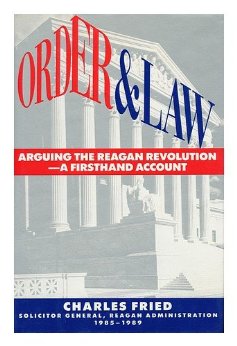'Order & Law: Arguing the Reagan Revolution - A Firsthand Account'
by Charles Fried
Simon & Schuster, $19.95
"Order & Law" is one of the best accounts of the inner workings of the Reagan administration, as seen by Charles Fried, a Harvard Law School professor who served as solicitor general from 1985 to 1989. In that capacity, he directed the elite group of Justice Department lawyers who represent the United States government before the Supreme Court.
Fried attempts to accomplish two goals: to respond to his critics and to recount his accomplishments. He succeeds in the latter; he fails in the former.
As solicitor general, Fried wholeheartedly embraced the "Reagan Revolution," and he spends a considerable amount of time articulating his version of the administration's conservative legal "philosophy" - with some pointed mischaracterization of "bad faith" liberalism along the way. Because of its frequent appearances before the Supreme Court, the "S.G.'s office" has long had a special relationship with the court, yet historically, its effectiveness has largely stemmed from its reluctance to advance rhetoric for political purposes.
All that changed, according to Fried's critics, during the Reagan administration. Far more than any of his predecessors, Fried looked to political, not legal, sources for his arguments. While some argue that the solicitor general should represent the ongoing U.S. government, not simply the political agenda of the current administration, Fried disagrees.
He derisively notes the career lawyers in the S.G.'s office who seemed "more interested in protecting their `special relationship' (with the court) than in arguing their `client's' position." To Fried, the solicitor was nothing more nor less than the administration's spokesman before the high court.
For example, Fried explicitly sought to have the court overturn Roe v. Wade, the landmark abortion case, despite the near hopelessness of his argument. The position was argued not to convince the court, but for political, public-opinion reasons.
He also reveals more than he intends in describing his conflict with the Justice Department over "federalism." Fried eloquently demonstrates the hypocrisy of much states'-rights rhetoric by describing the argument not as a matter of principle but as a dispute over which route would be more effective in achieving a political goal: deregulation. Power should be returned to the states, Fried argued, unless they adopted liberal regulatory schemes.
"Order & Law" finally is an odd and revealing mixture of legal philosophy and political history. To "movement conservatives," diehard liberals or anyone interested in the nuts-and-bolts of representing the federal government before the Supreme Court, it also is essential reading.
